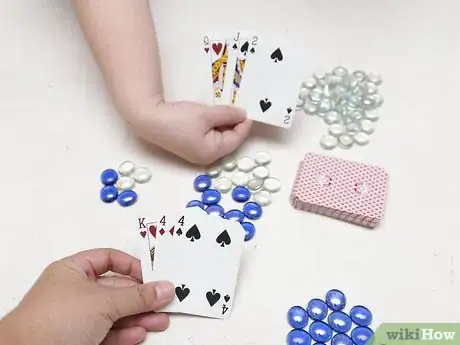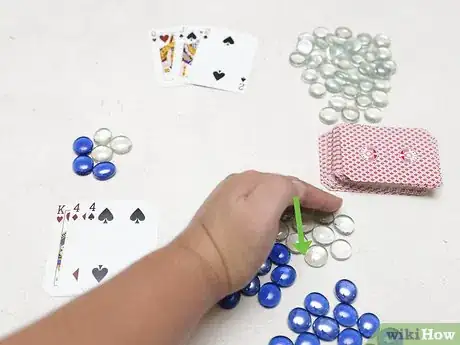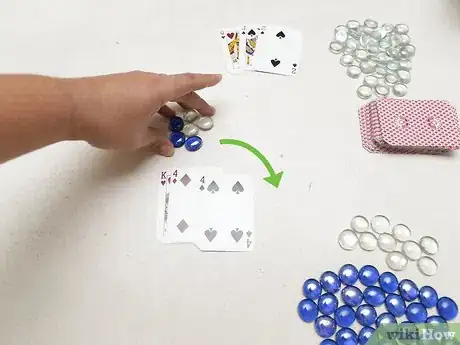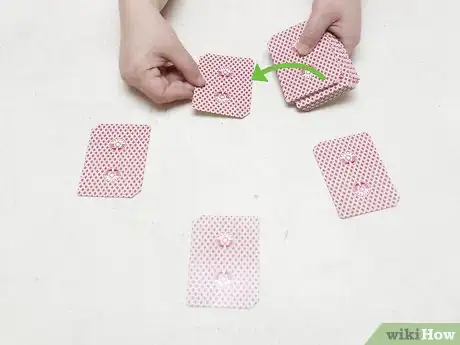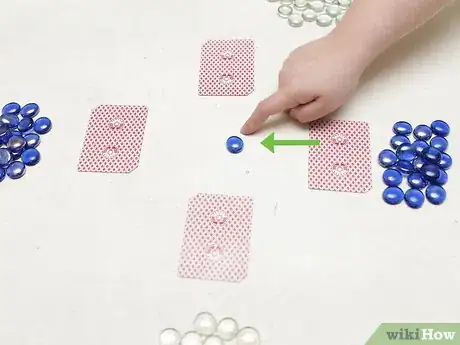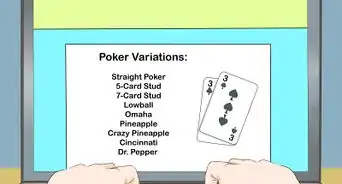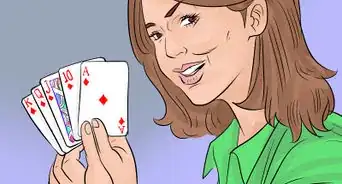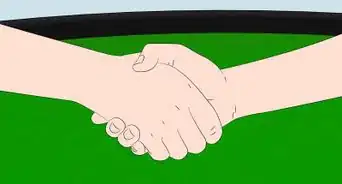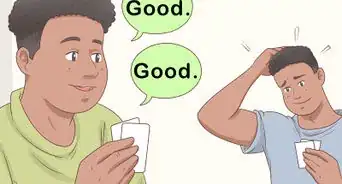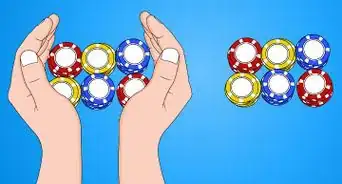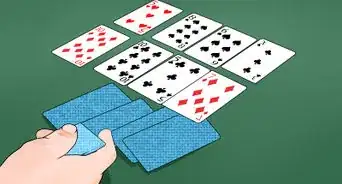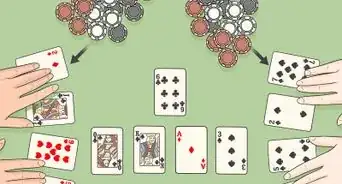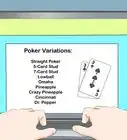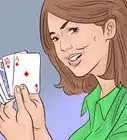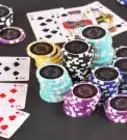wikiHow is a “wiki,” similar to Wikipedia, which means that many of our articles are co-written by multiple authors. To create this article, 10 people, some anonymous, worked to edit and improve it over time.
This article has been viewed 101,460 times.
Learn more...
Once the name of a more typical poker variant[1] , Three Card Poker now most commonly refers to a quick and simple casino game named after poker due to its similar (but not identical) hand ranking system. Unlike regular poker, Three Card Poker has each player trying to beat the dealer or simply get dealt a good hand, rather than compete against each other. Both games require very little setup and can easily be played at home.
Steps
Three Card Poker (Casino Game)
-
1Know the hand rankings. You will be gambling on the quality of your hand, so you'd better know how to determine this! If you're familiar with ordinary poker rankings, the only difference is that a straight is worth more than a flush (due to flushes being easier to get in a 3 card hand).[2] Otherwise, this table ranks the hands from highest to lowest:[3]
Three Card Poker Hand Rankings Hand Name Description Tie Breaker Straight Flush Three consecutive cards of the same suit (Aces high or low)
Higher ranking card wins
Three of a Kind Three cards of the same rank
Higher ranking card wins
Straight Three consecutive cards in mixed suits (Aces high or low)
Higher ranking card wins
Flush Three cards of the same suit
Higher of the highest card in each hand wins; if a tie, compare middle ranking cards, then lowest
Pair Two cards of the same rank, and one other card
Higher ranking pair wins; if a tie, higher of the third "odd card" wins
High Card Three cards, not all consecutive or in the same suit
Same as Flush tiebreaks
-
2Wager on beating the dealer (or decline to). Before any cards are dealt, each player decides on an Ante bet, or whether their hand will be better than the dealer's.
- If you're at a casino, place the amount of poker chips you wish to bet on the space labeled Ante.
- At home, you'll need a way to designate each player's Ante, Play, and Pair Plus® bets without getting them confused.
- Some casinos require that each player places an Ante bet, while others allow the player to bet solely on Pair Plus® (see below).
- Casinos often have a "table minimum", requiring each bet to be at least the posted amount.
Advertisement -
3Wager on the quality of your hand (or decline to). In addition to the Ante bet, you can optionally place a Pair Plus® bet, which gives payoffs according to the quality of your hand.[4]
- This also occurs before cards are dealt.
- This bet is named "pair plus" due to its payout on any hand with at least a pair or better.
-
4The dealer gives three cards each to the players and himself. The deck of cards is shuffled and dealt out face down.
- Each player looks at his own hand. There is no need for the dealer to do so.
-
5Decide whether to raise your wager against the dealer. Now that you've seen the quality of your 3-card hand, you decide whether to Play (or Raise) your Ante bet, or whether to Fold:
- In order to have the Ante bet stand, you must place an equal amount of money on the space designated Play.
- If you decide to Fold instead, the dealer takes your Ante bet and you cannot win that wager.
- In some casinos, folding will forfeit your Pair Plus® bet as well, if you made one.[5]
-
6Reveal all hands. Once all players who made an Ante bet have Played or Folded, all hands are turned face up.
- If a player Folded and did not place a Pair Plus® bet, the dealer usually takes his cards before hands are turned face up, since that player has no wager left standing.
-
7Determine Ante/Play payout. Any player who Played (Raised) their Ante bet compares his hand to the dealer and has a chance to win a payout according to the casino rules. If playing at home, use the following typical rules:[6]
- If the dealer's hand is High Card Jack or lower ("Jack High"), the dealer pays each player equal to that player's Ante bet ("even money") and returns each player's Ante and Play bets.
- If the dealer's hand is High Card Queen or better ("Queen High"), but worse than a player's hand, the dealer pays that player an amount equal to the player's Ante and Play bets combined and returns those bets.
- If the dealer has Queen High or a better hand, and exactly equal to a player's hand, the dealer returns that player's Ante and Play bets but pays no money.
- If the dealer has Queen High or better and beats a player's hand, the dealer keeps that player's Ante and Play bets.
-
8Determine Pair Plus® payout. Separate from the Ante Payout, each player who made a Pair Plus bet gets a reward based on their hand quality. The dealer's hand does not matter for this prize. If playing at home, use the following popular payout system[7] (a 3:1 reward means the player wins 3 times their pair plus bet):
Pair Plus Reward Hand Payout Straight Flush 40:1
Three of a Kind 30:1
Straight 6:1
Flush 3:1
Pair 1:1
High Card Player loses bet
Three Card Poker (Old Fashioned Poker Variant)
-
1Learn the Hand Rankings. The hand ranking system is the same as in the casino game. If you know ordinary poker hand rankings, the only difference is that a straight is worth more than a flush. Here are the full rankings from highest to lowest:
- 3 of a Kind. All 3 cards have the same point value or the same face printed on the card.
- Straight Flush. The 3 cards are in sequential point value and of the same suit.
- Flush. The 3 cards are all of the same suit.
- Straight. The 3 cards are in sequential point value.
- Pair. Any 2 of the 3 cards have the same face point value.
- High Card. The 3 cards do not match any of the groupings above. The highest value card is the value of the hand.
-
2Agree on the rules of play. Decide whether the Ace will only be used as the highest card in the deck, or whether it may be alternately be used as a 1 when forming a straight.
- In order to play with any other additional "house rules", every player must agree to them before the game begins.
-
3Deal one card to each player. You can decide who deals first randomly or through mutual agreement.
- Deal these cards face down and clockwise, starting with the player to the dealer's left.
- Players may look only at their own card.
-
4The player on the dealer's left may place a bet. Play moves clockwise from that player. Before the first bet has been made, each player has three options:
- Open the betting. The player places any amount of money (or other wagered items) in the center of the table (in the pot).
- Check. The player does not bet at this time but is still in this round.
- Fold. The player withdraws from the current round. She takes no more actions until the next hand is dealt.
- Note: If every player checks, skip straight to dealing the next card.
- You may wish to agree on a minimum or maximum bet.
-
5Once a bet has been made, play continues clockwise. The players now have three options:
- Call. The player matches the amount of the previously made bet, placing that amount in the pot.
- Raise. The player matches the amount of a previously announced bet, and adds an additional amount of money to it (their choice).
- Fold. As before, the player withdraws from this round.
-
6Once all remaining players have Called, deal a second card. Deal the cards face down to each player, starting with the player to the dealer's left.
- Each player should add the new card to their (now 2-card) hand and keep them secret from other players.
-
7Bet again. Repeat the wagering process until all of the remaining players have called or checked.
-
8Deal a third card. This final card is added to each player's hand.
-
9Repeat the betting. Each remaining player has the option to Call, Raise, or Fold until a full circuit of the table has Called.
- If all but one player decides to Fold, the remaining player wins the pot.
-
10Reveal all hands. Players lay their cards face up on the table. The winner is determined by the hand ranking. (See hand rankings listed earlier).
-
11The winner takes the pot. The player with the highest hand is be the winner. If two players have the same type of hand, whoever has the highest ranked card wins.
- The one exception comes up when comparing two hands of pairs. In this case the highest pair wins, not the highest cards. (For example, a 4-4-6 beats 2-2-10).
-
12Rotate dealers and play another round. The player to the previous dealer's left shuffles together all the cards and begins the next round.
-
13Play rounds until the players decide to stop. A player may walk away at any time or the players may mutually decide to stop. There is no required number of hands that must be played.
Warnings
- While Aces can be either high (A-K-Q) or low (3-2-A), they cannot "loop around" to form a straight. 2-A-K is not a valid straight.⧼thumbs_response⧽
Things You'll Need
- A deck of 52 playing cards
- Something to wager (poker chips, money, matchsticks, etc.)
For the Casino Game:
- At least two people (one dealer and any number of players)
- Space on the table for each player to designate three distinct betting zones
For the Old Fashioned Poker Variant:
- 2–6 people
References
- ↑ http://www.pagat.com/banking/3cardpoker.html
- ↑ http://www.vidpoker.com/threecardpoker/
- ↑ http://www.pagat.com/banking/3cardpoker.html
- ↑ http://www.pagat.com/banking/3cardpoker.html
- ↑ http://www.pagat.com/banking/3cardpoker.html
- ↑ http://www.pagat.com/banking/3cardpoker.html
- ↑ http://www.3cardpoker.com/rules/
- ↑ http://www.vidpoker.com/threecardpoker/
- "Hoyle's Rules of Games" Library of Congress Catalog Card Number 55-1340
About This Article
Three-Card Poker is a poker game where players try to beat the dealer by having a better three-card poker hand. In three-card poker, the hands are ranked from lowest to highest: high card, pair, flush, straight, three-of-a-kind, straight flush. At the beginning of the game, each player decides on an ante bet, or an amount they want to wager against the dealer. Players can also place a Pair Plus bet, which pays out if their hand has a pair or better. After the players have placed their bets, the dealer deals 3 cards to each player, including themselves. Then, each player looks at their hand and chooses to either play by matching their ante bet or fold by forfeiting their ante bet to the dealer. Once every player has played or folded, all of the cards are revealed. If the dealer has a jack high or lower, the dealer pays each player who didn’t fold an amount equal to their ante bet. If the dealer has a queen high or better but loses to a player’s hand, they pay that player an amount equal to their ante and play bet combined. If the dealer has a queen high or better and beats a player’s hand, they collect both the player’s ante and play bets. After the dealer pays out and/or collects from the other players, each player who made a Pair Plus bet and had a pair or higher receives a payout. The payout depends on how good the poker hand is—a pair is a 1:1 payout, a flush is a 3:1 payout, a straight is a 6:1 payout, a three-of-a-kind is a 30:1 payout, and a straight flush is a 40:1 payout. To lean how to play an old fashioned poker variant of 3 card poker, keep reading!





